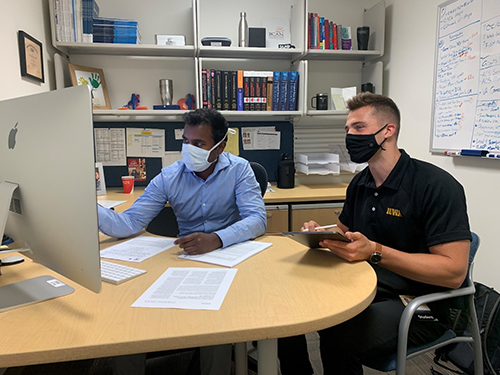Q&A with Ian McElree: Saving lives through storytelling with research data
Ian McElree is a first-year medical student at the Carver College of Medicine and will be presenting the research he conducted in Dr. Vignesh Packiam’s lab this past summer at the college’s 2021 Medical Student Research Conference.

What sparked your interest in pursuing research during medical school?
My involvement in research has continued to grow since my time investigating neurogenetics as an undergraduate in the Chun-Fang Wu lab at the University of Iowa. I was given the opportunity to explore my interests and develop new ideas that supplemented those learned in lecture. I began to unravel the mysteries I was most curious about and communicated my findings at conferences and in publications. These opportunities led to my passion for research, extending my involvement from prospective neurological clinical trials to surgical retrospective outcomes. As I begin my medical school career, I’m thankful for the great mentors and opportunities that have led me here today!
Summarize the research you will be presenting at this year’s Medical Student Research Conference:
Over the summer, I worked in the Department of Urology with Dr. Vignesh Packiam. Our primary goal was to review chemotherapeutics currently utilized for the treatment of Non-Muscle Invasive Bladder Cancer (NMIBC). Dr. Michael A. O’Donnell developed several effective and well-tolerated treatment regimens that prompted other institutions to adopt similar protocols. Presently, the standard of care for NMIBC, bacillus Calmette-Guerin (BCG), has been halted by production shortages and physicians are turning their attention to newer combination chemotherapies. Additionally, BCG is not always well-tolerated.
My focus was on the review of the salvage combination chemotherapy, gemcitabine and docetaxel (gem/doce). By reviewing patient charts and outcomes, we developed an understanding of the efficacy and tolerability of this medicine, as well as the survival outcomes. In addition to this therapy, I spent time investigating other salvage therapies used in the case of BCG and/or gem/doce failure for those who wish to preserve their bladders when faced with the prospect of bladder removal.
What is your favorite part about doing research in medical school?
My favorite part about performing research is seeing ideas come to life. Data tells a story, but it doesn’t always line up with your initial impression. The picture becomes clearer as you navigate through new ideas and ways to tell the story. After reaching a conclusion, the ability to demonstrate a narrative through writing or figures is exceptionally satisfying! I enjoyed working closely with Dr. Packiam and forming our own impressions and ideas about certain chemotherapeutics and the value they serve for many patients in need. By telling the story of our data, we hope to benefit those who need potentially life-saving therapies.
What advice do you have for other medical students or prospective medical students interested in doing research throughout their medical education? Or what is something you wish you knew before attending med school?
My advice is to get started early and find a mentor who is right for you. The mentor-mentee relationship is a very valuable component of performing research, so it’s okay to seek out other opportunities if it’s not the right fit. Once you have found something you’re interested in and have the right mentor, don’t be afraid to reach out often. You are the primary driving force for your research, don’t wait for your mentor to push you along.